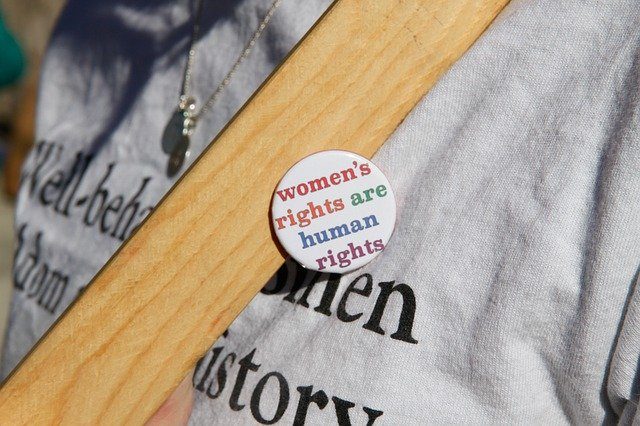The hashtag #HijaAko trended over the weekend as online protest mounted against passing the blame of rape cases on victims’ clothing.
The hashtag reached the Philippines trend list on Twitter with over 50,000 tweets on June 14.
It contained traumatic and tragic tales of rape from survivors and advocates.
The Spanish word “hija,” which the elderly or adults previously used to address daughters or girls, was used in the word war between veteran broadcaster Ben Tulfo and singer-songwriter Frankie “Kakie” Pangilinan for their differing stance on rape culture and victim-blaming.
Criticisms against the latter, however, were initially addressed to the now-deleted Facebook post of the Lucban Municipal Police Station in Quezon Province that warned women against wearing skimpy clothes, which local police claimed to provoke sexual harassment.
“Kayo naman mga gherlsz, wag kayo magsusuot ng pagkaikli-ikling damit at pag naman nabastos ay magsusumbong din sa amin. Isipin nyo rin,” the June 11 post of Lucban police read.
Pangilinan was among the Filipinos who aired their ire over the post.
“Stop teaching girls how to dress?? Teach people not to rape,” she said responding to the local police’s post.
Victims of any form of sexual violence and abuse are often attacked and put to shame for the crime that happened to them, citing their type of clothing or activity at the time of the incident provoked their perpetrators and abusers.
Women’s rights activists, groups and the victims themselves both in the country and overseas have since been trying to condemn such harmful perceptions that are still prevalent today.
Tulfo vs Kakie
On Saturday, Tulfo used “hija” to call out singer-songwriter Pangilinan on both Facebook and Twitter for the latter’s criticism against rape culture.
Tulfo’s tone on Twitter, however, differed from his post on Facebook.
On the microblogging platform, Tulfo tagged Pangilinan’s account and said: “A rapist or a juvenile sex offender’s desire to commit a crime will always be there. All they need is an opportunity when to commit the crime. Sexy ladies, careful with the way you dress up! You are inviting the beast.”
Hija @kakiep83 , a rapist or a juvenile sex offender's desire to commit a crime will always be there. All they need is an opportunity, when to commit the crime. Sexy ladies, careful with the way you dress up! You are inviting the beast.
— Ben Tulfo (@bitagbentulfo) June 13, 2020
On Facebook, on the other hand, Tulfo uploaded a screenshot of Pangilinan’s post and mentioned her father Sen. Francis “Kiko” Pangilinan who authored the Juvenile Justice Law, which is the country’s existing measure that deals with children in conflict with the law.
He also called her “the wannabe smart aleck.”
“Bago natin sila baguhin, baguhin muna natin ang sarili’t pag-iisip natin. Gets mo Hija? Tatay mo ang author ng Juvenile Law.”
THE WANNABE SMART ALECK(Batang-bata ka pa para malaman mo ang mundo)Hija, iba mag-isip ang mga manyakis at mga…
Posted by BITAG Live on Saturday, June 13, 2020
Kakie immediately clapped back and schooled Tulfo over his outdated notion on women and rape.
“Rape culture is real and a product of this precise line of thinking, where the behavior is normalized, particularly by men,” she said.
“The way anyone dresses should not be deemed as ‘opportunity’ to sexually assault them. Ever,” she added.
– rape culture is real and a product of this precise line of thinking, where the behavior is normalized, particularly by men.
– the way anyone dresses should not be deemed as ‘opportunity’ to sexually assault them. ever.
– calling me hija will not belittle my point. https://t.co/bLbtEDVGBn— hija (@kakiep83) June 14, 2020
Online protest vs victim-blaming
Online users including celebrities then used the hashtag #HijaAko to share their personal experiences of sexual assault and raise awareness on the crimes. They said that rapists should be held accountable for their misconducts and not blame it on the manner of clothing of women.
i was 17 when a man slipped his hand into my oversized denim jumper. 18, when a man unzipped my large coat to touch me. at 19, i was wearing baggy pants, only still to be groped.
stop blaming women for their clothes.
start holding men accountable for their actions.#HijaAko!!!— Janina Vela ✨🇵🇭 (@janinavela) June 14, 2020
Sexy women are raped.
Thin women are raped.
Fat women are raped.
Even BABIES and ANIMALS are raped.Stop thinking it’s about what we wear.
It’s not about “good” men being tempted by women’s sexy clothing.It’s about those men being rapists.
Educate THEM, not us.#HijaAko— Ai dela Cruz (@aidelacruz) June 14, 2020
I was at a bar in Boracay, sober, with my friends and a guy kept harrassing everyone there. He kept talking to me and bothering me and just grabbed my boobs out of nowhere. I was fully covered up even at the beach and yet he violated me publicly. #HijaAko https://t.co/loYgJKru41
— Lauren Young (@loyoung) June 14, 2020
Stop blaming it on what others wear and EDUCATE others that victims aren’t asking for it if they are dressed “SEXY”.
I’ll wear whatever I want and if its sexy and it turns you on well thats your problem, not mine. Because I dress up for me NOT you. #HijaAko
— Lauren Young (@loyoung) June 14, 2020
As a new form of protest, several online users, through hashtag #HijaAko, also shared horror stories of children as young as seven years old who were raped by their relatives or close family friends as proof that nothing, even clothes, matter to sex offenders.
tw: r***
7 years old: i was sleeping, in my usual pajamas. my late teenage cousin barged in, removed everything, and then he started doing it.
20 years old: i was sleeping in some pair of sportswear. my trusted colleague lay beside me, and then he started doing it. #HijaAko
— a white genderless giraffe (@bicolexpresses) June 14, 2020
Pakisabi po yan sa PEDIA patient namin noon na 11 yrs old palang may cervical cancer na kaka-gang rape sa kanya ng mga hinayupak na barkada ng “tatay” niya. I’m sure hindi siya nagpaka sexy. Nakakapanggigil! https://t.co/Voa1b0AiOl
— Dr. Geraldine Zamora (@doktora_ging) June 14, 2020
One Facebook user recalled the project by the United Nations Population Fund (UNFPA) and the UN Women called “Don’t Tell Me How to Dress,” wherein exhibits of outfits from victims and their stories were mounted in several big malls in the country in 2019.
Individuals who were featured ranged from as young as 18 months old to working adults.
This initiative likewise aimed to challenge the mindset of reproaching rape victims instead of going after their abusers.
Reminding Ben Tulfo and eveyone else that clothing has nothing to do with sexual assault.
Posted by Yna Dawal on Saturday, June 13, 2020
‘Rape is rape’
On Monday, the phrase “RAPE IS RAPE” in all caps, also landed on the top trending list of Twitter Philippines with more than 198,000 tweets. The tweets sought to educate the public amid the ongoing debate on rape culture and dress code.
‘Rape exists because of rapists’
Sen. Risa Hontiveros, also a women’s rights activist, pointed out that rape culture should start on changing the perception of men about rape.
“Instead of teaching women how to dress, we should teach men not to rape. Girls and women do not report sex crimes precisely because of the tendency to victim-blame. Let’s retire this thinking,” Hontiveros said.
2019 bar topnotcher Mae Diane Azores also emphasized this on Twitter.
“Rape exists because of rapists. Anyone who tries to justify rape because of how women dress is appalling and horrendous,” she said.
Gabriela Women’s Party also emphasized this on its social media platform.
Wearing short skirts does not cause rape.
Getting drunk does not cause rape.
Rapists DO cause rape.#HijaAko#LabananAngAbuso#StopVictimBlaming pic.twitter.com/mpn5CkXhkR
— Gabriela Women’s Party (@GabrielaWomenPL) June 14, 2020
Dress codes
This was not the first time that a local police unit shared similar posts on dress codes perceived to direct the fault of rape to women’s clothing.
In 2019, Caloocan City implemented an ordinance that penalizes its residents caught wearing topless or wearing a certain type of shorts in public. This applied to both male and female residents of the city.
Prior to that, the Angono Municipal Police in Rizal in 2018, also shared a now-deleted infographic that enumerated 10 tips against rape, one of which involved judgment on women’s clothes.










